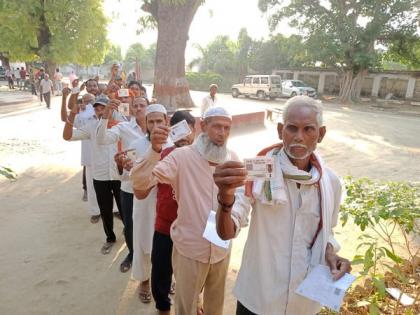India's monumental election logistics: A global showcase of democratic process
By ANI | Published: May 25, 2024 08:09 AM2024-05-25T08:09:52+5:302024-05-25T08:10:04+5:30
Sydney (Australia), May 25 : The world's largest democratic election is currently underway in India, with a staggering 968.8 ...

India's monumental election logistics: A global showcase of democratic process
Sydney (Australia), May 25 : The world's largest democratic election is currently underway in India, with a staggering 968.8 million registered voters.
This massive electoral process, nearly three times the population of the United States, is being conducted in seven phases, culminating on June 1. Vote counting will commence on the morning of June 4, with results expected by late evening.
Sanjay Pulipaka, Chairperson of the Politeia Research Foundation, highlighted the extraordinary logistics involved, in an article for the Lowy Institute, an independent think tank based in Sydney, Australia.
He emphasised that managing an election with a voter base exceeding twice the population of the European Union requires immense logistical expertise.
Registering nearly a billion voters in a linguistically diverse and educationally varied country has been achieved through sustained efforts by the Election Commission of India (ECI).
A dedicated portal, utilizing the Aadhaar unique identity card, facilitated voter registration.
Moreover, special outreach efforts targeted marginalized groups, including tribal communities and persons with disabilities.
Notably, there has been a significant rise in the enrollment of women voters.
The voter rolls for all 543 parliamentary constituencies are available online, ensuring transparent stakeholder verification.
To facilitate voting, over a million polling stations (1,048,202 to be exact) have been established.
Political parties also facing a colossal task. A national party contesting all constituencies would need to mobilize at least three million workersthree per polling stationwho must be well-versed in election regulations.
This mobilization includes designing communication material in more than two dozen languages.
Sanjay Pulipaka, in his article, wrote that a notable innovation in Indian elections is the use of electronic voting machines (EVMs).
Fully implemented since the 2004 general election, EVMs have dramatically reduced incidents of "booth capturing," where miscreants previously forced votes for their preferred candidates.
These battery-operated machines, capable of recording up to four votes per minute, are complemented by video surveillance and webcasting to enhance transparency.
Concerns about digital tampering of EVMs led the ECI to organize a hackathon, challenging sceptics to prove vulnerabilities, however, none were found.
To further ensure trust, the Voter Verifiable Paper Audit Trail (VVPAT) system was introduced, allowing voters to see a printout of their vote.
Random counts of VVPAT printouts verify the accuracy of EVMs. Each polling station undergoes a mock test of the EVM and VVPAT before voting begins, with party agents overseeing the process.
Despite robust safety measures, some petitions questioned EVM security. The Supreme Court of India upheld their integrity, declaring them "simple, secure, and user-friendly," and endorsed the VVPAT system for its vote verifiability.
However, challenges remain, particularly in funding. Without state funding for elections, political parties rely on private donations.
The Electoral Bond Scheme, introduced in 2017 for anonymous donations, was struck down by the Supreme Court. Comprehensive legislation is needed to ensure transparent funding for political campaigns.
The successful execution of India's general elections showcases the state's capacity for large-scale initiatives. Similar efficiency has been seen in the polio and Covid-19 vaccination campaigns.
The challenge lies in translating this "mission mode" capability into everyday governance to address citizens' needs. Moreover, recent e-governance initiatives and improvements in the ease of doing business have offered hope.
India's experience in conducting elections in a diverse, developing country provides valuable lessons for the global community.
Notably, ECI officials also assisted Sudan in its first elections in 1953. Sharing India's electoral expertise could enhance democracy promotion worldwide, offering a nuanced approach to supporting national and subnational entities in organizing elections.
Disclaimer: This post has been auto-published from an agency feed without any modifications to the text and has not been reviewed by an editor
Open in app